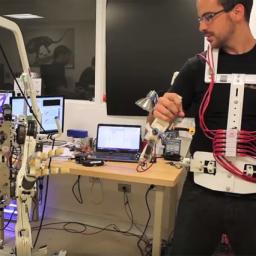In the wake of a stolen Xbox being tracked down via wireless controllers, Microsoft has
updated the Windows 10 terms and conditions such that they "may automatically check your version of the software and download software update or configuration changes, including those that prevent you from accessing the Services, playing counterfeit games, or using unauthorised hardware peripheral devices."
The wording "unauthorised hardware peripheral devices" is a little hazy. Does this mean Microsoft can now block uncertified PC or illegally-modified Xbox One and Xbox 360 controllers? Furthermore, Microsoft's agreement doesn't state if it will also disable other counterfeit software, such as cracked versions of Office or Adobe Photoshop, or if it only cares about pirated Microsoft games.
The services agreement was clearly written originally for Xbox and Xbox Live, and when writtten was probably only intended to ever apply to them. However, because Microsoft has simply taken an existing services agreement and applied it to core Windows 10 services like Cortana means that, intentionally or accidentally, it could be applied to Windows 10. We think it's unlikely that Microsoft actually intends to go after pirated games on the PC, but until Microsoft clarifies things, this remains a grey area.
On Thursday, the Federal Communications Commission is expected to require that phone companies warn residential customers three months before they abandon a landline/copper network. The rules would
prohibit companies from retiring a copper network through neglect. Phone and cable companies would also have to warn customers with newer technologies that the phone will go out with the power, so people can get replacement alarms and backup batteries if necessary.
Many people already scoff at the idea of a landline. About 45 percent of U.S. households just use cellphones. But outside of cities, cell service can be poor. Even among households with wired phone service, about half of them have already ditched copper-based landlines for an Internet-based phone service. Estimates say that about 80 million people as well as several million small businesses still rely on traditional copper-based phone service, but the march away from copper appears inevitable.
But a home phone that relies on the Internet will go out when the power does. With copper networks, the phone line delivers its own power source and will continue to work. In addition, many home burglar alarms and medical alert systems require the copper network, so people need time to get replacements. The agency would also require that phone and cable companies sell customers backup batteries with eight hours of power. After three years, batteries would have to last 24 hours.
This coincides with the
$10.54 billion sale of all of Verizon's landline (copper & FIOS) service areas in California, Florida and Texas, to Frontier Communications. The deal which will affect millions of customers, is expected to be completed in 2016. The cash being used to fund investments in Verizon's far more profitable wireless/cellular services business.
An Australian court has ruled that people accused of illegally downloading the film Dallas Buyers Club cannot be requested to pay more than
the cost of a legitimate copy of the film. As a precaution, Justice Nye Perram will also require the company to pay a AU$600,000 bond before requiring the targeted ISP to release identifying details of the alleged infringing parties, as the company has no presence in Australia.
This is in stark contrast to the abusive copyright trolling/extortion that has become common in the United States, where hundreds of accused individuals are sent letters demanding a fee of up to $5,000 to settle, using the expense of litigation, and the threat of statutory damages, to extract settlements hundreds of times higher than the cost of its movie. Why do we see this difference? The answer is straightforward: Australia does not have statutory damages for copyright infringement. This allowed the court to tie damages to the actual harm suffered. In contrast,
U.S. copyright law provides statutory damages of up to $150,000 per work and does not require any showing of harm. Excessive penalties are baked into the U.S. system which encourages trolling and abuse.

Famed phone leaker @evleaks is at it again, this time with a few more shots of BlackBerry's forthcoming Venice handset. Venice is
a slider phone that sports a large touchscreen display and runs Android instead of Blackberry's proprietary BB10 operating system. It slides up to reveal a physical QWERTY keyboard in portrait mode, giving owners of the device the best of both worlds, or so BlackBerry hopes. The Canadian outfit has been struggling for the past several years, and is hoping Venice will change that. The company built a reputation that was based in part on excellent hardware keyboards, and though the mobile market has moved to touchscreens, there are still many users who prefer the feel of a physical plank. Venice will give users a choice between the two input methods. Venice has been "confirmed" to launch in November on all four national U.S. wireless carriers -- Verizon, AT&T, T-Mobile, and Sprint.
As one who loves BlackBerry hardware but not the software, I'm excited about the potential of a proper QWERTY phone with Android apps. Because these are leaks, the details are still up in the air. Nonetheless, it's
looking more and more likely that BlackBerry will be launching an Android phone sometime this year. It's also becoming increasingly clear that the device will probably be a slider, and that it will possibly run Google Play services.
Energy efficiency investments are widely popular because they are believed to deliver a double win: saving consumers money by reducing the amount of energy they use, while cutting climate-forcing greenhouse gas emissions and other pollutants harmful to human health. But a new study by a team of economists finds residential energy efficiency investments may not deliver on all that they promise. Through a randomized controlled trial of more than 30,000 households in Michigan - where one-quarter of the households were encouraged to make residential energy efficiency investments and received assistance - the economists find that the
costs to deploy the efficiency upgrades were about double the energy savings.
While the researchers found that the upgrades did reduce the households' energy consumption by about 10 to 20 percent each month that only translated into $2,400 in savings over the lifetime of the upgrades - half of what was originally spent to make the upgrades, and less than half of projected energy savings. "In actuality, the energy efficiency investments we evaluated delivered significantly lower savings than the models predict." Further, some say that the broader societal benefits - savings as a result of reductions in pollution from energy production- justify the investments. But the findings did not support this. The cost per ton of CO2 avoided in the sample amounted to $329, significantly larger than the $38 per ton that the federal government estimates as the social cost of carbon.
NASA robots may climb the walls of the International Space Station one day using grippers inspired by the super-adhesive feet of geckos. Scientists at the space agency's Jet Propulsion Laboratory (JPL) in Pasadena, California, are
developing a "gecko gripper" system that could help robots inspect and repair the space station's exterior, and perhaps conduct a wide range of activities in Earth orbit.
The gripping system doesn't lose its stickiness over time the way tape does, researchers added, and it should work well in all environments - even those featuring extreme temperatures, pressures and/or radiation conditions. The lizards rely on millions of tiny hairlike protrusions that become powerfully adhesive (to the electrons orbiting atoms) when bent, due to a phenomenon called van der Waals forces.
The team has already started testing out the gecko gripper in the micro-gravity environment, using the technology to grab and manipulate objects during parabolic airplane flights. The researchers have also affixed gecko-gripper feet to a climbing robot called Lemur 3, which can clamber over simulated solar panels and other spacecraft parts as a result.
Related article:
Climb der Waals with gecko-inspired grippersTrying to get back to a 'new poll every Monday' routine, if possible, and I've hit the ground running with a vague, poorly-organized question about where we'd like to see some more innovation. Probably could have put more thought into categories and parameters for the question, but fire away: the world could use some improvement; where shall we begin? Curious to hear the debate. Enjoy!

Advances in robotics are entering a new phase of complexity, including in the essential balance feedback response area of research, which is essential to mobility. Check out HERMES, as just one example:
The researchers worked with
HERMES, a 100-pound biped robot designed by the MIT team, along with the interface, for disaster response. They envision deploying HERMES to a disaster site, where the robot would explore the area, guided by a human operator from a remote location. The researchers will present a paper on the interface at the IEEE/RSJ International Conference on Intelligent Robots and Systems in September. MIT's two-legged robot is wreaking controlled havoc: punching through drywall, smashing soda cans, kicking over trash buckets, and karate-chopping boards in half. The robots actions, however, are not its own. Just a few feet away, PhD student Joao Ramos stands on a platform, wearing an exoskeleton of wires and motors.
Ed note: I propose building two of these things, and then having the two researchers/controllers fight it out.
While companies look to deliver packages in a matter of minutes using drone technology, NASA engineers are exploring ways to
bring similar "on-demand mobility" to people. In less than a decade, small commuter airlines could be flying electric planes. And as aircraft design and battery technology progress to extend even greater ease of use to the public, the sky would literally become the limit.
A key technology that NASA and its commercial partners are developing to help drive the future toward such personal air vehicles, as well as vastly improve general-aviation aircraft and commercial delivery services, is called "distributed electric propulsion." It's a rapidly evolving technology that Moore says is the biggest shift in aerospace technology since the invention of the turbine engine. By using battery-powered motors to turn compact propellers distributed along an aircraft's wing, he said, a plane becomes easier to handle, lighter, less noisy and more environmentally friendly. Demonstrator tests are showing as much as a 500 percent reduction in the energy needed to perform a high-speed cruise. It can also perform better in a tricky vertical take-off or landing.

As stocks of Silicon Valley companies soar and revenues are growing, institutional shareholders are typically reluctant to rock the boat by questioning a company's managers. But
some grumpy investors have been sending messages of frugality to maturing tech companies such as Oracle, Salesforce.com and Yahoo, whose executives rake in record-setting compensation packages each year. Their high pay is inviting emerging dissent.
Now required by the 2010 Dodd-Frank law, "say on pay" measures offer shareholders a chance to be heard in a non-binding vote for or against executive compensation plans. In June, nearly half of Salesforce shareholders thumbed their noses at Benioff's compensation in such a vote. At Yahoo, the board members who recommended Mayer's pay package were quietly hit with a minority protest vote. A McKesson investor and warehouse worker Glenn Gray spoke up at the annual shareholder meeting two years ago, in order to contrast the lavish executive pay at the giant pharmaceutical distributor, with his own low wages and benefits. Shareholders applauded his three-minute speech. He also got fired. But "the poster child for bad compensation" McKesson CEO John Hammergren's annual pay package has declined steadily in recent years.
"Generally, CEO pay is not going down, so activism has not had a tangible effect on overall pay in that respect," said Dan Marcec of Equilar. At the same time, "we're seeing a lot of people get more involved and be more scrutinizing," and boards are responding to demands for prudence by cutting some perks and better justifying others, he said. While there have been steps toward reform, the "level of pay far outstrips what is justified, even by the best performance" at many companies, said Laura Campos.


